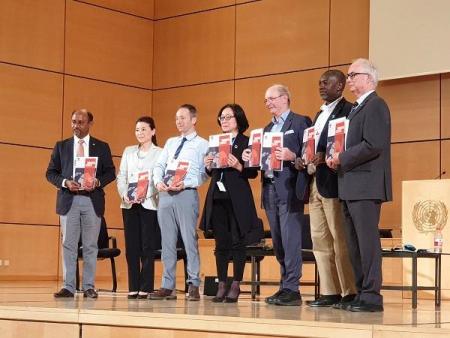
Editor-in-chief, Prof. Rajib Shaw (left) with Panellists at the Science&Policy Forum at the launch the new journal Progress in Disaster Science
By Omar H. Amach
GENEVA, 13 May 2019 - A rich discussion on how to better integrate science into disaster risk reduction policy highlighted the importance of creating knowledge that is reflective of the “truth on the ground” and directly benefits local communities.
The Science and Policy Forum brought together over 150 scientists and government officials as part of the preparatory sessions ahead of the Global Platform for Disaster Risk Reduction 2019, which will take place 15-17 May in Geneva.
Opening the forum, Ms Mami Mizutori, Head of the UN Office for Disaster Risk Reduction (UNDRR), discussed the importance of reaching out to science students to encourage them to consider specializing in a DRR-related field:
“Especially in developing countries, we need to encourage the development of a new generation of local researchers who are focused on disaster risk reduction. They are best positioned to understand their countries and region and to enrich science with indigenous knowledge.”
The localisation of disaster science was a common theme in the forum, both in terms of tailoring knowledge products and information to suit the needs of local populations, be they government officials or ordinary people, and in terms of integrating local knowledge into disaster science.
An example that highlighted this two-way exchange was provided by Dr. Shanna McClain, from NASA’s Earth Science Division, who showcased how NASA designed an exposure analysis study to improve the resilience of Rohingya refugee camps in Cox’s Bazar.
The NASA study focused on exposure to landslides as it was the top concern of residents. It then combined its remote sensing capabilities with data gained from local sources to pinpoint locations that were at risk of landslides.
“It is important to incorporate the community perspective to create data that matters,” said Dr. McClain.
The need to localise disaster science also came up in the context of developing hazard terminology. As attention is increasingly turning to building disaster resilience at the community level, this requires local buy-in, and a key to gaining that is by establishing a common understanding of risk.